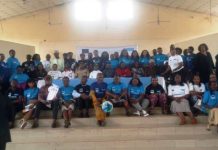FIC Report (Lagos State) – Lagos State is on the cusp of transitioning from malaria control to total elimination, according to a progress report presented at the mid-term review of the Pathway to Malaria Pre-elimination and Digitisation Programme in Lagos yesterday.
The State’s Commissioner for Health, Prof. Akin Abayomi, disclosed that about 40,000 malaria Rapid Diagnostic Tests (mRDTs) conducted by Patent and Proprietary Medicine Vendors (PPMVs) and Community Pharmacies (CPs) revealed a notably low malaria positivity rate. “Data from public health facilities also showed sustained reductions in malaria positivity rate, underscoring the coherence of the statewide approach,” Prof. Abayomi said.
Speaking at the event, Governor Babajide Sanwo-Olu emphasized the state’s clear goal. “When the Pathway to Malaria Pre-elimination and Digitisation Programme was kicked off in March, we had a clear goal in mind: to transform hope into tangible results and to shift Lagos from a high burden of malaria to pre-elimination, which will ultimately pave the way for a malaria-free future,” the Governor stated.
The programme aims to reduce malaria prevalence in Lagos to below 1 per cent by focusing on improving diagnostics, ensuring consistent treatment, and enlightening the community. Governor Sanwo-Olu explained that implementing real-time reporting systems and utilising digital platforms in public and private facilities would bridge the information gap that used to slow down diagnosis, reporting, and response times.
“The IMPACT Project, which is backed by both national and international funding sources, including support from the World Bank and the Islamic Development Bank, has played a vital role in financing and providing technical assistance for our efforts in Lagos and beyond,” Governor Sanwo-Olu said.
Through partnerships with innovative companies, the state is enhancing diagnostic accuracy, standardising case management, and integrating private providers into the state surveillance system. These initiatives enable Lagos to respond more swiftly and allocate resources where they are needed most.
Prof. Abayomi noted that the Ministry of Health had stepped up regulation and quality assurance, with the Health Facilities Monitoring and Accreditation Agency (HEFAMAA) intensifying its oversight to reduce disparities in service delivery and reinforce equity across public and private care.
Governor Sanwo-Olu urged Lagosians to join the fight against malaria. “Every little action counts, whether it is getting rid of standing water, using treated nets when needed, or getting tested before taking antimalarials. Residents must set an example for our health workers by testing, recording, treating properly, and reporting. If each of us plays our part, we will make great strides toward eliminating malaria and reaching a point where it is no longer a common issue in our State,” he appealed.
The mid-term review examined key areas critical to consolidating gains made from the initiative’s rollout, including data visibility for accountability, scale and quality of intervention, and community involvement. The state aims to identify hotspots for increased surveillance, retrain private providers, track test-before-treatment adherence, and integrate reported data into the State health dashboard.
“Together, we are consolidating gains and building irreversible momentum. With unity of purpose and courage of conviction, we will continue to scale our efforts and move Lagos ever closer to the ultimate prize, which is a future free from the scourge of malaria,” Prof. Abayomi said.
Signed
IYEDEH, Onowouzou David
ACIO
12/9/2025






